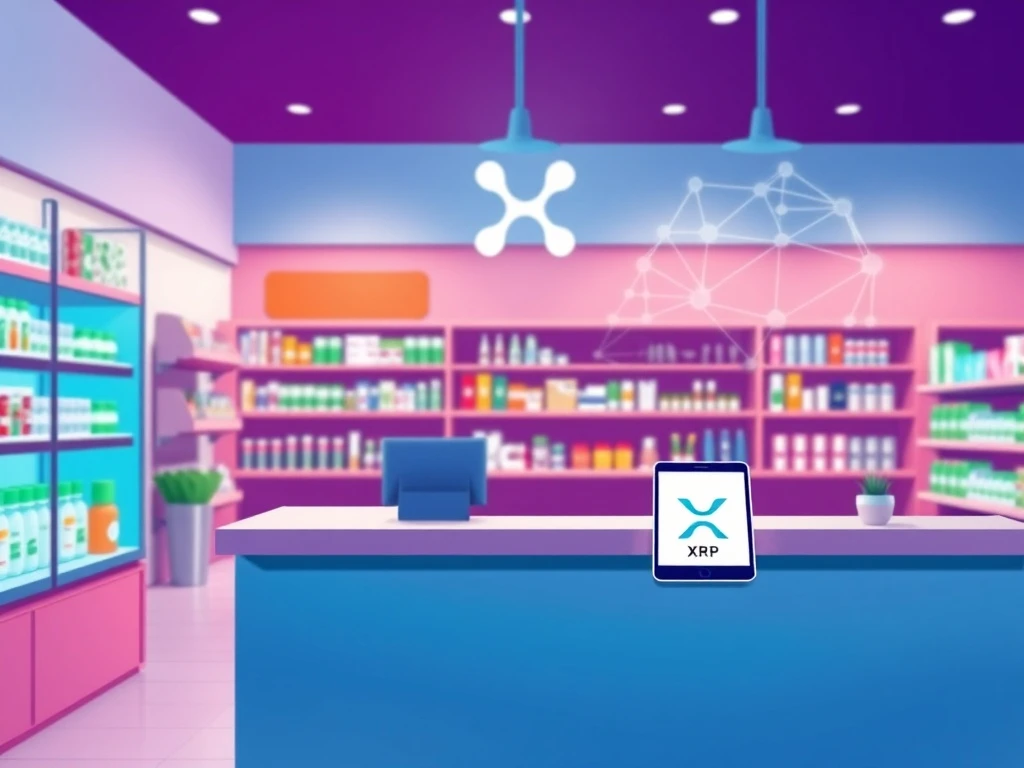XRP Payments: Revolutionizing Healthcare with Blockchain Adoption for 6,500 US Pharmacies

The cryptocurrency world recently witnessed a groundbreaking development. Wellgistics, a prominent prescription drug distributor, announced a pioneering move. They are integrating XRP payments into their system for over 6,500 independent US pharmacies. This initiative marks one of the first large-scale blockchain payment systems in the healthcare sector. It truly signals a new era for digital health payments in health services.
Wellgistics Pioneers XRP Payments for Pharmacies
Wellgistics Health is bringing Ripple’s XRP Ledger to thousands of US pharmacies. This innovative system allows pharmacies to settle prescription drug payments using cryptocurrency. The company, a major digital prescription routing provider, partnered with pharmaceutical software firm RxERP. Together, they developed this robust blockchain-based payment solution. It offers a modern alternative to traditional bank transfers for wholesale drug purchases. Furthermore, the system records all payments directly on the XRP Ledger. This ensures transparency and efficiency.
Brian Norton, CEO of Wellgistics, highlighted the forward-thinking nature of independent pharmacy owners. He stated, “Independent pharmacy owners are far more forward-thinking than many realize. They see the power of blockchain and understand how transformative this will be as it scales across the industry.” This statement underscores the readiness of the healthcare sector to embrace new technologies. Importantly, Wellgistics confirms the system adheres to strict healthcare and financial regulations. This includes HIPAA privacy requirements and Anti-Money Laundering (AML) laws. Consequently, it ensures secure and compliant operations.
Driving Efficiency with Ripple’s XRP Ledger
The integration of Ripple’s XRP Ledger offers significant advantages. XRP, known for its speed and low transaction costs, provides an ideal foundation for high-volume payments. Traditional bank transfers often involve delays and higher fees. In contrast, blockchain technology streamlines these processes. Pharmacies can now move funds quickly and cost-effectively. This efficiency can reduce operational overhead for drug distributors and pharmacies alike. Moreover, the immutability of the XRP Ledger enhances auditability. Every transaction is permanently recorded. This transparency builds trust and simplifies reconciliation processes within the supply chain. Thus, the system not only accelerates payments but also improves financial tracking.
The Expanding Landscape of Blockchain in Healthcare
While blockchain and crypto are not always “hot” topics in healthcare, the sector shows steady movement toward real-world adoption. Since 2023, this technology has delivered major efficiencies worldwide. Its benefits extend beyond faster, cheaper payments enabled by crypto and stablecoins. Grand View Research highlights this growth. They valued the global blockchain in healthcare market at $7.04 billion in 2023. Projections show it reaching an impressive $214.86 billion by 2030. This substantial growth indicates a strong belief in blockchain’s transformative potential. Furthermore, the technology promises to enhance data security and interoperability. These are critical aspects in the healthcare industry.
One key area where healthcare meets Web3 is decentralized science, or DeSci. Alex Dobrin of VitaDAO, a collective focused on extending human lifespans, discussed DeSci’s impact. In a September 2024 interview, he noted DeSci’s ability to cut costs. It also accelerates drug development through more efficient capital use. Similarly, Asher Looi, co-founder of blockchain and AI diagnostics firm BitDoctor.ai, sees potential. He believes decentralized models could streamline complex clinical trials. This potential is evident in related markets. The decentralized clinical trials segment, for example, is forecast to grow significantly. It could expand from $8.3 billion in 2023 to about $33 billion by 2033. A Market.us report confirms this projection. Despite these advancements, blockchain in healthcare still faces roadblocks. Germany’s government-backed blockchain healthcare pilots stalled in 2024. This was mainly due to strict data privacy rules under Europe’s General Data Protection Regulation (GDPR). These regulations pose challenges for data sharing on public blockchains.
Cryptocurrency in Pharmacies: A Growing Trend
The adoption of cryptocurrency in pharmacies, spearheaded by Wellgistics, signifies a broader trend. Businesses are exploring digital assets for various operational needs. This move by Wellgistics demonstrates a practical application of crypto beyond speculative trading. It offers tangible benefits for businesses. The system simplifies the payment process for pharmacies. It also provides an alternative to traditional banking rails, which can be slow and expensive. This innovation could set a precedent for other sectors. Furthermore, it validates the utility of cryptocurrencies like XRP for enterprise solutions. The shift towards digital health payments in healthcare is gaining momentum. It promises a more efficient and transparent financial ecosystem. This evolution could reshape how medical transactions occur globally.
Healthcare Giants Embrace Digital Assets
Several healthcare entities have recently added digital assets to their corporate treasuries. This trend further illustrates the healthcare industry’s growing interest in cryptocurrency. In June, Prenetics Global Limited, a health sciences company listed on Nasdaq, made headlines. They became the first healthcare firm to launch a significant Bitcoin treasury strategy. The company acquired 187 BTC, valued at $20 million, through Kraken. To oversee this initiative, Prenetics appointed Andy Cheung, former OKEx chief operating officer, to its board. This strategic move highlights a forward-thinking approach to corporate finance. It also signals confidence in Bitcoin as a long-term asset.
Similarly, Singapore-based Basel Medical Group announced ambitious plans in May. They intend to establish a Bitcoin reserve by acquiring $1 billion in BTC. The healthcare company stated this move aimed to bolster its expansion capabilities. However, this significant announcement triggered a 15% drop in its share price. This reaction underscores the market’s mixed perceptions regarding large-scale crypto investments by traditional companies. Despite some volatility, the overall trend points towards increasing acceptance. Healthcare companies are actively exploring digital assets. They see potential for financial diversification and operational advantages. These developments pave the way for wider crypto integration across the sector.
The debut of XRP payments by Wellgistics for US pharmacies marks a pivotal moment. It showcases the practical utility of blockchain technology in a critical industry. As the healthcare sector continues its digital transformation, cryptocurrencies like XRP will likely play a larger role. This innovation promises to deliver greater efficiency, transparency, and cost savings. Ultimately, it benefits both providers and patients. The future of healthcare finance is rapidly evolving, with digital assets leading the charge.







